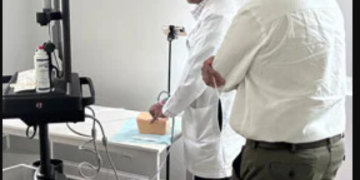Acupuncture has been used for centuries to promote overall well-being and support reproductive health. Today, many couples facing fertility challenges turn to acupuncture for fertility alongside conventional treatments such as in-vitro fertilisation (IVF) and intrauterine insemination (IUI). This holistic approach can enhance fertility outcomes by improving blood circulation, reducing stress, and balancing hormones. Here, we explore the benefits of pairing acupuncture with fertility treatment and why it is gaining recognition among medical professionals and fertility specialists.
1. Enhancing Blood Flow to the Reproductive Organs
One of the key benefits of acupuncture is its ability to increase blood flow to the reproductive organs. By stimulating specific acupuncture points, blood circulation to the ovaries and uterus is enhanced, ensuring a healthier uterine lining and optimal conditions for embryo implantation. Studies suggest that improved blood flow can also help regulate ovulation and enhance egg quality, both of which are essential for successful conception.
2. Reducing Stress and Anxiety
Fertility treatments can be physically and emotionally challenging, often leading to increased stress levels. High stress can negatively impact reproductive hormones and disrupt ovulation in women, while in men, it can reduce sperm quality. Acupuncture helps to lower cortisol levels (the stress hormone) and promote relaxation by stimulating the release of endorphins. Many patients report feeling calmer and more emotionally balanced after acupuncture sessions, making the fertility journey more manageable.
3. Balancing Hormones Naturally
Hormonal imbalances are a common cause of fertility issues. Acupuncture works by regulating the endocrine system, helping to balance hormones such as oestrogen, progesterone, and luteinising hormone. This is particularly beneficial for women with conditions like polycystic ovary syndrome (PCOS) or irregular menstrual cycles. By promoting hormonal harmony, acupuncture supports a more predictable ovulation cycle and improved fertility outcomes.
4. Supporting IVF and IUI Success Rates
Acupuncture is widely recommended as a complementary therapy for those undergoing assisted reproductive technology (ART) treatments like IVF and IUI. Research suggests that acupuncture performed before and after embryo transfer can increase implantation rates and support a successful pregnancy. By improving uterine receptivity and reducing uterine contractions, acupuncture helps create a more favourable environment for embryo implantation.
5. Improving Egg and Sperm Quality
For couples experiencing fertility challenges, the quality of eggs and sperm is a critical factor. Acupuncture has been shown to enhance ovarian function, improving egg quality and quantity. In men, acupuncture can improve sperm motility, concentration, and morphology. By boosting overall reproductive health, acupuncture enhances the chances of natural conception and successful fertility treatments.
6. Regulating the Menstrual Cycle
A regular and healthy menstrual cycle is essential for fertility. Acupuncture helps to regulate menstrual cycles by addressing underlying conditions such as irregular ovulation, painful periods, and endometriosis. By promoting a more predictable cycle, acupuncture increases the likelihood of conception, whether naturally or through assisted fertility treatments.
7. Strengthening the Uterine Lining
A thick and receptive uterine lining is crucial for embryo implantation. Acupuncture enhances blood circulation to the uterus, promoting the growth of a healthy endometrial lining. A well-nourished lining increases the chances of successful implantation and reduces the risk of miscarriage in early pregnancy.
8. Reducing the Side Effects of Fertility Medications
Many women undergoing fertility treatments experience side effects from medications, including bloating, mood swings, and fatigue. Acupuncture helps alleviate these symptoms by supporting the body’s natural balance and reducing inflammation. Patients often report feeling more energised and experiencing fewer adverse effects when incorporating acupuncture into their fertility treatment plan.
9. Supporting Male Fertility
While fertility treatments often focus on female reproductive health, male fertility plays an equally important role. Acupuncture can help improve sperm count, motility, and morphology by increasing circulation to the reproductive organs and reducing oxidative stress. This makes it a valuable complementary therapy for couples struggling with male-factor infertility.
10. Encouraging Emotional and Physical Well-being
The journey to parenthood can be emotionally demanding. Acupuncture provides a holistic approach to fertility by addressing not only physical health but also emotional well-being. Regular sessions help reduce anxiety, improve sleep quality, and promote an overall sense of balance, which is beneficial for both partners undergoing fertility treatment.
How Often Should You Have Acupuncture for Fertility?
The frequency of acupuncture sessions depends on individual needs and treatment plans. For those preparing for natural conception, weekly sessions may be recommended to regulate cycles and improve reproductive health. For individuals undergoing IVF or IUI, acupuncture is often scheduled in line with key treatment milestones, such as before and after embryo transfer. Many fertility specialists suggest starting acupuncture at least three months before attempting conception to allow the body time to respond and optimise reproductive function.
Choosing a Qualified Acupuncturist
When seeking acupuncture for fertility, it is essential to work with a qualified and experienced acupuncturist specialising in reproductive health. Look for practitioners who are licensed and have expertise in fertility acupuncture to ensure the best possible care and treatment outcomes.
Conclusion
Pairing acupuncture for fertility with conventional treatments offers a holistic and supportive approach to improving reproductive health. By enhancing blood circulation, reducing stress, balancing hormones, and supporting IVF success rates, acupuncture plays a crucial role in fertility treatment. Whether you are trying to conceive naturally or undergoing assisted reproductive technologies, incorporating acupuncture into your fertility journey can offer numerous benefits, making the process more effective and less stressful.
If you are considering acupuncture as part of your fertility plan, consult with a professional acupuncturist to develop a personalised treatment approach tailored to your needs.






























































